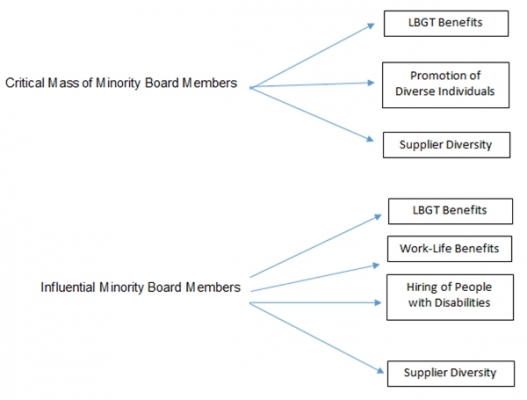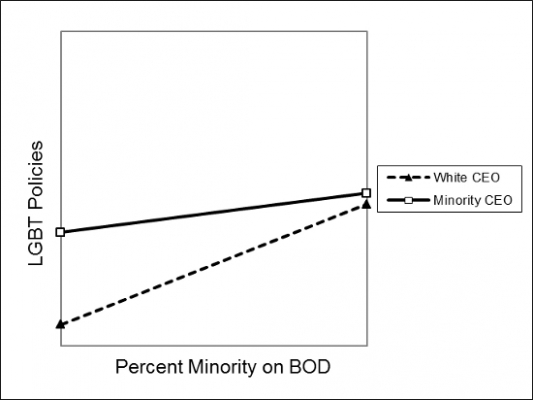
Diverse boards, rather than CEOs, are key to advancing equity and diversity in companies.

American companies face mounting pressure to advance workplace equity and diversity. From business consultants to human resource personnel, from shareholders to the media, the message to companies is clear: diversity and equity matter in today’s workplace. But what is the best path for companies to achieve these goals? Using data from Fortune 500 firms,Alison Cook and Christy Glass argue that the key is promoting diversity on the board of directors.
How can companies effectively advance equity and diversity? Our research suggests that board diversity is critical for advancing both goals. Conventional wisdom suggests that companies can achieve diversity through a variety of diversity efforts, including diversity training or mentorship programs. Yet evidence suggests that such efforts have little or no impact on organizational practice. Instead, we show that companies can advance equity and diversity by promoting minorities to top leadership positions.
To test the impact of minority leaders on organizational change we collected data on all Fortune 500 firms over a ten year period. For each company we examined the race/ethnicity of the CEO and the racial/ethnic composition of the board. We also measured a company’s record on a range of equity and diversity outcomes, including work-life benefits, LGBT policies, promotion of diverse individuals, the hiring of people with disabilities, and supplier diversity.
We discovered that minority leaders play an important role in motivating organizational change but not necessarily in the ways you might think. We found that the racial/ethnic characteristics of the CEO had no significant impact on organizational practice when it comes to diversity and equity. Companies with a minority CEO were no more likely than companies with a white male CEO to advance work life balance or to promote diverse individuals.
On the other hand, diversity on the board does make a difference. In fact, board diversity is associated with positive organizational change in at least two ways, as Figure 1 shows. First, the presence of multiple minorities on the board is strongly associated with a solid diversity record. Second, the presence of influential minority board members can positively affect a company’s adoption of a wide range of equity and diversity practices.
Figure 1 – Relationships of Direct Effects for Minority Board Members and Diversity Outcomes

So how does board diversity matter? Numbers and influence.
Numbers first. As Figure 2 shows, a critical mass of minority directors can drive organizational change by providing needed support for and sponsorship of novel proposals by other directors—a degree of support that a single minority CEO, even those committed to diversity programs—may lack. A critical mass can also reduce the salience of race/ethnicity within the leadership team thereby empowering minority leaders to champion diversity initiatives without fear of scrutiny or bias.
Figure 2 - Relationships of Combination Effects for CEO and Boards of Directors and Diversity Outcomes



But influence matters too. Influential minority directors—even if they are the only minority on the board—are able to drive organizational change because the information and perspectives they bring to the firm are perceived as trustworthy, legitimate and relevant. These leaders are able to successfully influence their peers to pursue innovation and change. The adoption of formal policies can be a powerful catalyst for change. The offering of diversity and equity policies not only affects the opportunities of those within the organization but can also convince other organizations to follow suit.
Appointing minority leaders to the board not only impacts policy but practice as well. Companies with diverse boards have better minority representation within the organization including in leadership positions, are more likely to rely on minority-owned suppliers, and are more likely to provide their workers with benefits that support work-life balance. By promoting formal diversity policies, minority directors advance broad organizational change.
Pressure to champion diversity and equity comes from many different sources. Yet understanding how to best achieve these goals is important for guiding positive organizational change. Our research suggests that companies serious about diversity and equity must focus on the characteristics of decision makers.
This article is based on the paper, “The Power of One or Power in Numbers? Analyzing the Effect of Minority Leaders on Diversity Policy and Practice”, in Work & Occupations.
Featured image credit: Richard Rutter (Flickr, CC-BY-2.0)


Thank you for registering on VERCIDA - the leading job site for companies that are passionate about diversity and inclusion.
- Check out our client profiles to get the latest on their DE&I credentials
- Look out for client benefits next to all our job specs
- Sign up for job alerts to keep up to date on new roles as they come in
- Search 1000s of roles from the biggest brands
Please proceed to the next step. If you are unable to complete the next stage of application please use the contact form HERE.

 Help us find the best workplace for you by sharing more about yourself.
We will never disclose your information with others.
Help us find the best workplace for you by sharing more about yourself.
We will never disclose your information with others.